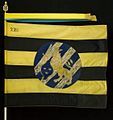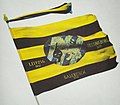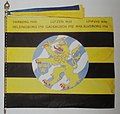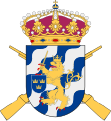Älvsborg Regiment
| Älvsborg Regiment | |
|---|---|
| Älvsborgs regemente | |
 | |
| Active | 1624–1713, 1714–1998 |
| Country | |
| Allegiance | Swedish Armed Forces |
| Branch | Swedish Army |
| Type | Infantry |
| Size | Regiment |
| Part of | 3rd Military District (1833–1893) 3rd Army Division (1893–1901) III Army Division (1902–1927) Western Army Division (1928–1936) III Army Division (1937–1943) III Military District (1943–1966) Western Military District (1966-1992) Southern Military District (1993-1998) |
| Garrison/HQ | Borås |
| Motto(s) | Vilja - Förmåga - Uthållighet[note 1] ("Will - Ability - Endurance") |
| Colors | Yellow and black |
| March | "Lübner Jäger" (Müller)[note 2] |
| Battle honours | Varberg (1565) Lützen (1632) Leipzig (1642) Helsingborg (1710) Gadebusch (1712) Nya Älvsborg (1719) |
| Insignia | |
| Branch insignia m/60 |  |
| Unit insignia m/60 |  |
| Shoulder sleeve insignia |  |
The Älvsborg Regiment (Swedish: Älvsborgs regemente), designation I 15 and I 15/Fo 34, was a Swedish Army infantry regiment that traces its origins back 1624. It was disbanded in 1998. The regiment's soldiers were originally recruited from the provinces of Västergötland, and it was later garrisoned there in the town Borås.
Heraldry and traditions
[edit]Colours, standards and guidons
[edit]The regiment has carried a number of colours over the years. On 24 June 1854, the then crown prince, later King Charles XV presented the last battalion colours to the regiment. They were so called Oscar I type, and were presented at a summit on Axevalla heath. In 1904 the regiment adopted the 1st battalion's colour as regimental colour (which has been hanging in Älvsborgsmässen ("Älvsborg Mess") at Gothenburg Garrison since 1998).[3]
Its last colour was presented to the former Älvsborg Regiment (I 15/Fo 34) at the Artillery Yard in Stockholm by the Supreme Commander, general Owe Wiktorin in 1996. It was used as regimental colour by I 15/Fo 34 until 1 July 1998.[4] The colour was drawn by Ingrid Lamby and embroidered by machine in insertion technique by Maj Britt Salander/company Blå Kusten. Blazon: "The cloth divided six times in yellow and black, in the centre a circular shield with the badge of the regiment; azure, three wavy white bends sinister, charged with a yellow lion rampant with a royal crown proper, armed and langued gules, in the right forepaw a yellow sword and in the left a blue shield with three yellow crowns placed two and one. On the uppermost yellow length, battle honours (Lützen 1632, Leipzig 1642, Helsingborg 1710, Gadebusch 1712, Nya Älvsborg 1719) in black".[4]
After the regiment was disbanded, the colour was passed on to the Älvsborg Group (Älvsborgsgruppen). Since 1 July 2005, the colour is carried by Elfsborg Group (Elfsborgsgruppen). The Elfsborg Group is also the unit that keeps the regimental traditions.[5] The pattern of the colour has basically been unchanged since the 1600s.[3]
-
Battalion colour m/1849, for Älvsborg Regiment's 2nd battalion.
-
Älvsborg Regiment's 1st battalion colour from 1858.
-
1996 regimental colour
Coat of arms
[edit]The coat of the arms of the Älvsborg Regiment (I 15/Fo 34) 1977–1994 and the Älvsborg Brigade (Älvsborgsbrigaden, IB 15) 1994–1997. Blazon: "The regimental badge, with waves six times divided bendy-sinister azure and argent, a double-tailed crowned lion rampant or, armed and langued gules, in dexter forepaw a sword or and in sinister a shield azure charged with three open crowns or placed two and one. The shield surmounted two muskets in saltire, or".[6] The coat of arms of the Älvsborg Regiment (I 15/Fo 34) 1994–1997 and the Älvsborg Group (Älvsborgsgruppen) 1997–2004. Blazon: "Azur, the regimental badge, three waves bendy-sinister argent, a double-tailed crowned lion rampant or, armed and langued gules, in dexter forepaw a sword or and in sinister a shield azure charged with three open crowns or, placed two and one. The shield sur-mounted two swords in saltire, or."[6]
-
Coat of arms of the Älvsborg Regiment (I 15/Fo 34) 1977–1994 and the Älvsborg Brigade (Älvsborgsbrigaden, IB 15) 1994–1997.
-
Coat of the arms of the Älvsborg Regiment (I 15/Fo 34) 1994–1997 and the Älvsborg Group (Älvsborgsgruppen) 1997–2004.
Medals
[edit]In 1999, when the regiment was disbanded, the Älvsborgs regementes (I 15) minnesmedalj ("Älvsborg Regiment (I 15) Commemorative Medal") in silver (ÄlvsbregMM) was established. It consist of a Maltese cross in blue enamel. The medal ribbon is of red moiré with two blue stripes on the middle.[7]
-
Älvsborg Regiment (I 15) Commemorative Medal
Commanding officers
[edit]Regimental commanders active at the regiment the years 1624–1998.[8]
Commanders
[edit]- 1624–16??: N Ribbing
- 1698–1710: A Sparrfelt
- 1710–1728: J von Mentzer
- 1728–1739: J A Lillie
- 1739–1747: Carl Otto Lagercrantz
- 1747–1751: J L von Saltza
- 1751–1763: R J von Lingen
- 1763–1766: Fredrik Ribbing
- 1766–1769: Johan Cronhielm
- 1769–1781: B P von Wufrath
- 1781–1800: H W Hamilton
- 1800–1805: E Edenhielm
- 1805–1810: Eberhard von Vegesack
- 1810–1817: C Reuterskiöld
- 1817–1869: J von Utfall
- 1869–1886: P H Melin
- 1886–1892: A A Thorén
- 1892–1894: Christer Gustaf Oxehufvud
- 1894–1898: L J P Liljencrantz
- 1898–1903: Carl Axel Leonard Nordenadler
- 1903–1906: Oscar Silverstolpe
- 1906–1913: Gustaf Henrik Sjöqvist
- 1913–1916: Adolf Erik Ludvig Lagercrantz
- 1916–1920: Ernst Lars Isaac Silfverswärd
- 1920–1927: Karl Alfred Rignell
- 1927–1936: Axel Gustaf von Arbin
- 1936–1938: Arvid Moberg
- 1938–1942: Anders Teodor Bergquist
- 1942–1951: Gunnar Fredrik Brinck
- 1951–1956: Colonel Gustav Åkerman
- 1956–1959: Colonel Erik Rosengren
- 1959–1962: Bengt Uller
- 1962–1966: Sigmund Ahnfelt
- 1966–1975: Karl Gunnar Lundquist
- 1975–1981: Senior colonel Åke Ingmar Lundberg
- 1981–1986: Sven Henry Magnusson
- 1986–1989: Per Blomqvist
- 1989–1992: Svante Bergh
- 1992–1998: Matts Uno Liljegren
- 1998–1998: Nils Erling Krister Edvardsson
Deputy commanders
[edit]- 1979–1981: Colonel Ingmar Arnhall
Names, designations and locations
[edit]| Name | Translation | From | To | |
|---|---|---|---|---|
| Kungl. Älvsborgs regemente | Royal Älvsborg Regiment | 1624–03–10 | – | 1713-05-06 |
| Kungl. Älvsborgs regemente | Royal Älvsborg Regiment | 1714-??-?? | – | 1974-12-31 |
| Älvsborgs regemente | Älvsborg Regiment | 1975-01-01 | – | 1998-06-30 |
| Designation | From | To | ||
| No. 15 | 1816-10-01 | – | 1914-09-30 | |
| I 15 | 1914-10-01 | – | 1975-06-30 | |
| I 15/Fo 34 | 1975-01-01 | – | 1998-06-30 | |
| Location | From | To | ||
| Timmele Heath | 1685-??-?? | – | 1770-??-?? | |
| Kila Heath | 1770-??-?? | – | 1783-??-?? | |
| Örby Heath | 1783-??-?? | – | 1796-??-?? | |
| Fristad hed | 1797-??-?? | – | 1914-??-?? | |
| Borås Garrison | 1914-??-?? | – | 1998-06-30 |
See also
[edit]Footnotes
[edit]- ^ The motto was established on 20 March 1981. Later used by the Elfsborg Group (Elfsborgsgruppen) and the garrison units at the Swedish Armed Forces Centre for Defence Medicine as well as the 44th Home Guard Battalion.[1]
- ^ The march was adopted circa 1875 and established in 1953 by Army Order 33/1953. The march was used by the Älvsborg Brigade (Älvsborgsbrigaden) from 1994 to 1997 and by the Älvsborgs Group (Älvsborgsgruppen) from 1998 to 2005.[2]
References
[edit]Notes
[edit]- ^ Handbok: parad 6: traditionsvård 2017, p. 65
- ^ Sandberg 2007, p. 55
- ^ a b Braunstein 2003, pp. 69–72
- ^ a b Braunstein 2004, p. 78
- ^ "Försvarets traditioner i framtiden – Bilaga 3" (PDF) (in Swedish). Statens försvarshistoriska museer/Försvarets traditionsnämnd. 1 July 2012. p. 2. Retrieved 7 June 2018.
- ^ a b Braunstein 2006, p. 24
- ^ Braunstein 2007, p. 107
- ^ Kjellander 2003, pp. 336–337
- Braunstein, Christian (2003). Sveriges arméförband under 1900-talet. Skrift / Statens försvarshistoriska museer, 1101-7023 ; 5 (in Swedish). Stockholm: Statens försvarshistoriska museer. ISBN 91-971584-4-5. SELIBR 8902928.
- Braunstein, Christian (2004). Svenska försvarsmaktens fälttecken efter millennieskiftet [The flags and standards of the Swedish armed forces after the turn of the millennium] (PDF). Skrift / Statens försvarshistoriska museer, 1101-7023 ; 7 [dvs 8] (in Swedish). Stockholm: Statens försvarshistoriska museer. ISBN 91-971584-7-X. SELIBR 9815350.
- Braunstein, Christian (2006). Heraldiska vapen inom det svenska försvaret [Heraldry of the Swedish Armed Forces] (PDF). Skrift / Statens försvarshistoriska museer, 1101-7023 ; 9 (in Swedish). Stockholm: Statens försvarshistoriska museer. ISBN 91-971584-9-6. SELIBR 10099224.
- Braunstein, Christian (2007). Utmärkelsetecken på militära uniformer [Decorations on Swedish military uniforms] (PDF). Skrift / Statens försvarshistoriska museer, 1101-7023 ; 12 (in Swedish). Stockholm: Statens försvarshistoriska museer. ISBN 978-91-976220-2-8. SELIBR 10423295.
- Kjellander, Rune (2003). Sveriges regementschefer 1700-2000: chefsbiografier och förbandsöversikter (in Swedish). Stockholm: Probus. ISBN 91-87184-74-5. SELIBR 8981272.
- Sandberg, Bo (2007). Försvarets marscher och signaler förr och nu: marscher antagna av svenska militära förband, skolor och staber samt igenkännings-, tjänstgörings- och exercissignaler (in Swedish) (New ed.). Stockholm: Militärmusiksamfundet med Svenskt marscharkiv. ISBN 978-91-631-8699-8. SELIBR 10413065.
- Handbok: parad 6: traditionsvård : H PARAD 6 2016 (PDF) (in Swedish). Stockholm: Försvarsmakten. 2017. SELIBR 22459606.
Further reading
[edit]- Bondestam, Torgny, ed. (1974). En bok om I15: Kungl Älvsborgs regemente 1624-1974 (PDF) (in Swedish). Borås: I15. SELIBR 1333674. Archived from the original (PDF) on 29 October 2019.
- Djurberg, Nils (1956). Kungl. Älvsborgs regementes chefer 1624-1956 (in Swedish). [Borås]: Utg. SELIBR 2117737.
- Hallqvist, Ingvar (2001). Norra Kinds kompanis indelta soldater, Kungl Älvsborgs regemente I 15: ett västgötskt kompani 1685-1901. Västgöta genealogiska förenings skriftserie, 0283-5800 ; 4 (in Swedish). Viskafors: Västgöta genealogiska fören. ISBN 91-970726-3-X. SELIBR 8383509.
- Mankell, Julius (1866). Anteckningar rörande svenska regementernas historia (in Swedish) (2nd ed.). Örebro: Lindh. pp. 310–318. SELIBR 1549756.
- Älvsborgs regemente under 374 år (in Swedish) (1st ed.). [Borås]: [Älvsborgs regementes traditioner]. 2000. ISBN 91-630-9506-8. SELIBR 7454722.
- Rydin, Herman, ed. (1964). 1914-1964: Kungliga Älvsborgs regemente (in Swedish). Borås. SELIBR 3203321.
{{cite book}}: CS1 maint: location missing publisher (link)






